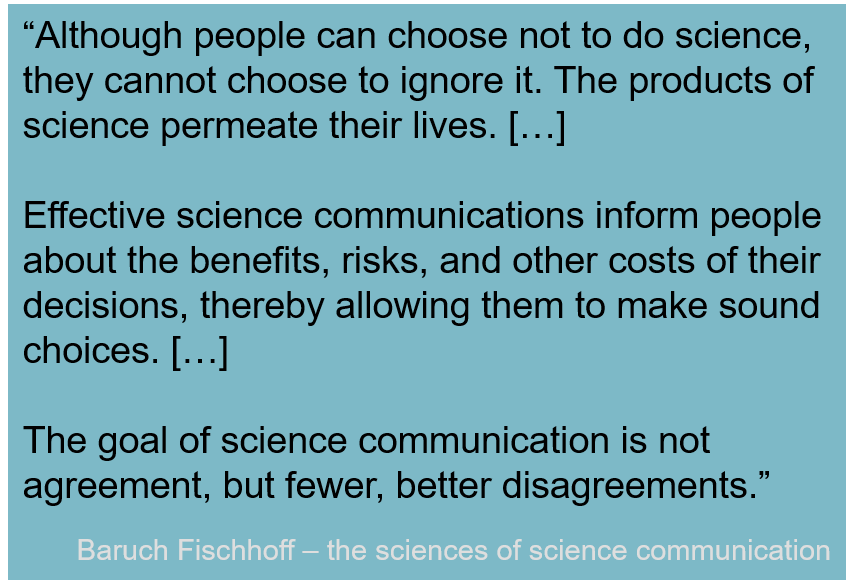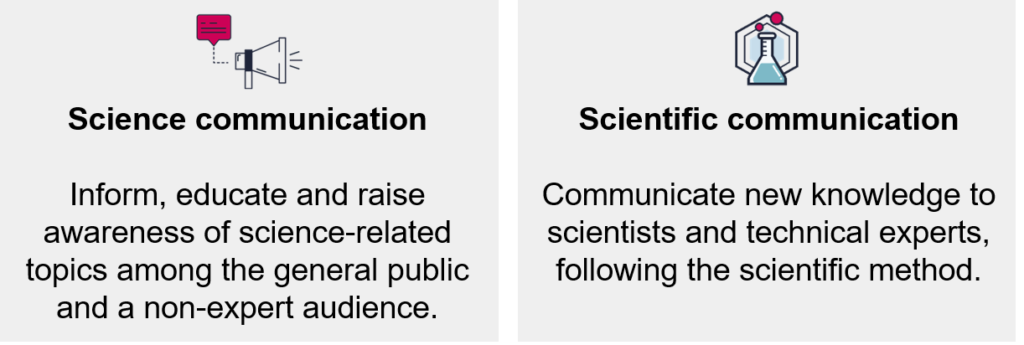Why science communication is an important (transferable) skill for researchers
25th March 2021 at 5:43 pm
The amount of new data and scientific articles published each year is astonishing and a challenge to keep up with. PubMed counts more than 1 million papers per year in the biomedical field alone, and during the first half of 2020, a particular time no doubt, more than 23,600 unique published articles related just to COVID-19 were indexed on Web of Science and Scopus. This is partially the result of researchers being measured by their sheer number of publications and citations. With this being a key requirement to progress in academic and professional careers, the pressure is high, especially on researchers still at the early stages of their career. On top of this, researchers are ever more expected to communicate their science not just within the scientific community but with society as a whole.
Why researchers and scientists should communicate to “the outside world”

Scientific and technological advances and innovations permeate our modern society, where making everyday decisions based on sound and accurate information is critical, yet sometimes challenging. Researchers have the advantage of being at the forefront of scientific progress, but, as this advantage is typically financed through public funding, e.g., Marie Curie Innovative Training Networks / Doctoral Networks for early-stage researchers (ESRs) or other instruments within the EU Framework Programme for Research and Innovation, they are also expected to share their knowledge and inform the public on both the benefits and risks of their discoveries, guiding unbiased, evidence-based decision making. This past year has been a good example of the importance and delicate role of science communication. Effective science communication can have an impact on politics, healthcare and policy agendas, contributing to our well-being and that of the environment that surrounds us.
Aside from benefiting society as a whole, communicating outside the scientific community can also intrinsically help boost a researcher’s career, by maximising the impact of their latest results, giving rise to new collaborations across sectors, contributing to their public profile and opening doors to unexpected opportunities.
Science communication is an important transferable skill

Communicating science with the broad range of audiences that make up “the outside world” is a science of its own, and very different from the scientific communication that happens at conferences, research workshops and through peer-reviewed publications. Indeed, scientific communication is used to communicate new scientific knowledge mostly through scientific papers, technical reports, presentations at conferences and grant applications, to an audience of researchers, scientists and technical experts. On the other hand, science communication deals with communicating with a broad range of audiences that forms the general public, informing, educating, and raising awareness of science-related topics.
Overwhelmed by actually doing the science, writing grant applications and trying to keep up with new publications from peers and colleagues, many researchers neglect building on their science communication skills or to find efficient ways of communicating with different audiences. But science communication is a valuable transferable skill, one that is becoming more and more important with the increase of digital communication channels and platforms. A recent overview of science communication in Europe highlighted how science communication on social media is especially on the rise, with several scientists and experts sharing their work on Twitter. Despite this, and perhaps especially due to the ease of hopping on to the social media train, many still lack the training and knowledge for effective science communication.
How researchers and especially ESRs can improve their science communication skills
SCI:COM 2021, an online event hosting discussions, workshops, seminars and networking on science communication, took place just a couple of weeks ago. There, science communication experts and scholars highlighted how mastering the basics of science communication, such as identifying clear and simple messages, knowing and understanding the audience, and making use of narrative, among others, are always important principles when communicating science and have proven to be of critical importance during what the WHO is referring to as the current “infodemic”.
At accelopment we put these basics and other key principles of science communication into practice on a daily basis, as we support science communication, outreach and dissemination in more than 26 ongoing EU-funded research and innovation projects. With a wealth of knowledge, strengthened by a long-standing experience as a Partner Organisation providing science communication support and transferable skills training in dozens of Innovative Training Networks (ITNs), we are passionate about helping researchers improve their science communication skills. Valuing the importance of evidence-based information and of equipping researchers with the key skills to share their findings with a variety of audiences, we offer an online training module on Science communication specifically targeted to Early Career Researchers (ESRs) in ongoing ITNs and future Horizon Europe Doctoral Networks. Knowing the basics is important and we like to help researchers master these from early on in their career. However, when part of European funded projects, it is not only necessary to know the basics of good science communication but to also follow specific guidelines by the European Commission when applying these.
Are you familiar with science communication in the context of European funded projects? Have a go at testing your knowledge with the quiz below.
Get in touch with us to discuss your options for training modules tailored to your needs.

Jacqueline Strehler
Research & Innovation Project Manager
References
Landhuis, E. Scientific literature: Information overload. Nature 535, 457–458 (2016). https://doi.org/10.1038/nj7612-457a
Teixeira da Silva, J.A., Tsigaris, P. & Erfanmanesh, M. Publishing volumes in major databases related to Covid-19. Scientometrics 126, 831–842 (2021). https://doi.org/10.1007/s11192-020-03675-3
